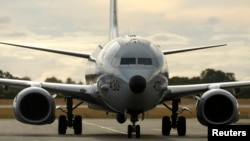Singapore's agreement this month to host a spy plane for the United States marked a step forward in a decades-old alliance between the two countries, analysts say.
The U.S. P-8 Poseidon aircraft deployed from Singapore for the first time between December 7 and December 14. Wang Dong, a professor of international relations at Peking University, said that step built upon decades of bilateral collaboration on defense and security concerns.
“I think this is actually not sort of a sudden development," the professor said. "It’s part of the continuation of the closer security ties between Singapore and the United States over the past few years.”
While Singapore and the U.S. have never signed a mutual defense treaty, their ties stretch back to the Vietnam War, when Singapore agreed to repair and maintain U.S. naval ships.
The arrangement was mutually beneficial, because it provided a boost to Singapore’s economy after Britain’s withdrawal from the country. In the years that followed, Singapore courted U.S. influence as a counterweight to China and Russia during the Cold War, and in 1990 and 1998 it signed agreements with the U.S. to provide logistical support for U.S. forces and aircraft and to allow U.S. naval vessels to dock at Singapore’s naval base.
Carl Thayer, professor emeritus at the Australian Defense Force Academy, said Singapore's strategic objective is "to keep any potential enemy as far away from Singapore as possible, and that means the Poseidon’s important. It means maritime awareness; they need to know what’s out there and what’s likely to be of threat, and to have an air force that’s able to act.”
The United States also uses bases in Japan and the Philippines to conduct surveillance flights in the region. The expansion in Singapore provides another location for flights at a time of rising tensions over the disputed South China Sea.
China claims nearly all of the resource-rich waterway, which is one of the busiest shipping lanes in the world.
Joseph Cheng, an expert on international relations and professor emeritus at the City University of Hong Kong, said Singapore "has been eager to maintain ASEAN [the Association of Southeast Asian Nations] as the central regional organization maintaining a regional balance through including, especially, the United States.”
While China remains Singapore’s biggest trading partner, the U.S. remains a strategic ally, with relations likely to grow closer in the years to come.




